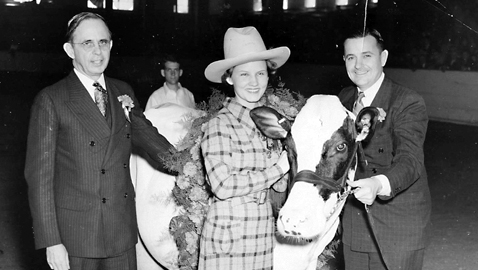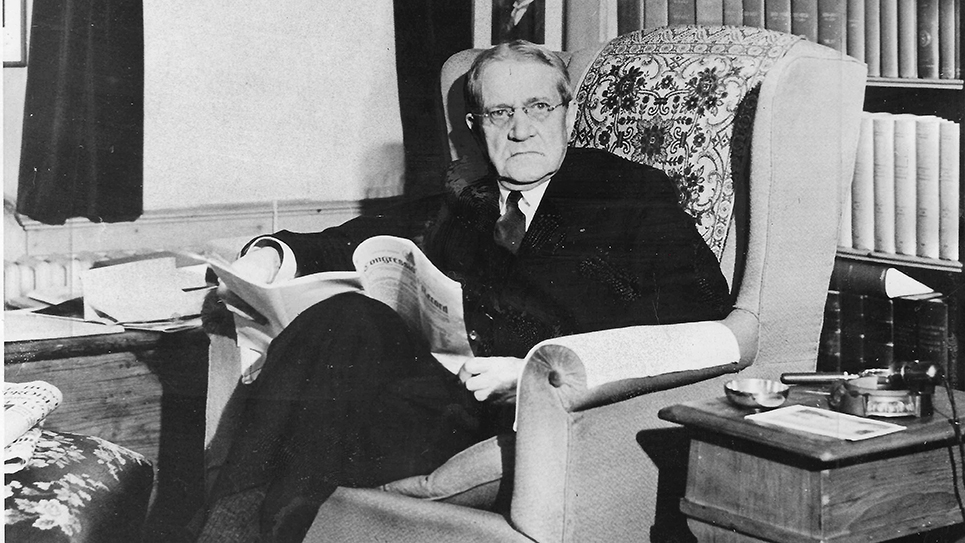By Ray Hill
Tennessee, like every other state in the union, had been devastated by the Great Depression. The suffering in Tennessee was accentuated by the fact almost seven million dollars in state money had been lost when Caldwell and Company, one of the largest banking enterprises in the South, collapsed. That had caused Governor Henry H. Horton to quite nearly be impeached. Although eligible to run for reelection, Horton wisely opted not to seek another term.
State Treasurer Hill McAlister, who had narrowly lost bids for governor against incumbents in 1926 and 1928, jumped into the race. So did Lewis S. Pope, Commissioner of Institutions under five different Tennessee governors. Pope had been ousted by Henry Horton and the former commissioner had also run in 1926. Pope had only garnered 27,720 votes statewide, running a very poor third. McAlister had lost by only just over 5,000 votes.
The third serious candidate competing for the Democratic nomination for governor was ex-governor Malcolm Rice Patterson. “Ham” Patterson had been governor of Tennessee from 1907 – 1911, but had been driven from office by scandal. Patterson had run a strong race for the United States Senate in 1915, but had lost the Democratic nomination to Congressman Kenneth D. McKellar.
The campaign was hard fought and Pope took an early lead in the election returns, running very strongly in rural Tennessee. McAlister had always run well inside the more urban districts and those were the last to report their election returns. It soon became clear former governor Patterson would run third.
Lewis S. Pope spent an anxious night, which became increasingly bad as the sun began to rise. Hill McAlister pulled ahead, based upon returns from the most populous counties in Tennessee; Pope also received the tragic news that his father had passed away. Pope sadly headed for his native Pikeville to bury his father.
Pope’s showing had been impressive; he carried the Second, Third, Fourth, Sixth, Seventh and Eighth Congressional districts. McAlister won the First, where Senator Kenneth McKellar was quite popular; the Fifth, which was centered around Davidson County, where he had the support of the machine headed by Nashville Mayor Hilary Howse. Lastly, McAlister won in Shelby County where he had the support of E. H. Crump. McAlister won the Democratic nomination with 116,832 votes to 107,449 votes for Lewis Pope. McAlister’s margins in the larger counties had been greater than those enjoyed by Pope in the smaller counties.
Former governor Malcolm Patterson limped in third with 59,392 votes.
Almost immediately there were rumblings that Lewis Pope was not content to accept the verdict of Tennessee Democrats.
Hill McAlister did not wait to hear more and immediately released a statement accusing Luke Lea of masterminding the contest to his rightful nomination. McAlister charged that the idea came from the “fertile brain” of Colonel Lea. McAlister also accused Lea of having “deliberately betrayed” Malcolm Patterson.
“I am not in the least disturbed and shall not be intimidated by Luke Lea’s threats to contest a Democratic nomination which I have fairly and honestly won,” McAlister said.
Just days after the primary election, Lewis Pope announced he was challenging the results. Lewis Pope’s challenge of Hill McAlister’s nomination was based on race.
- Pope Shepherd, Lewis Pope’s attorney, said the unsuccessful gubernatorial candidate would contest the election results before the Tennessee State Democratic Executive Committee. Shepherd claimed the election had been influenced by the votes of Negroes. Shepherd said more than 15,000 Negroes had voted in Shelby County alone. Shepherd also said there was “excessive” voting by African – Americans in Davidson County.
“Mr. Pope states that he is convinced that he has been nominated by the Democratic voters of the state and will not surrender to the domination and control of 15,000 Shelby County Negroes voted under the direction of Boss Crump,” Shepherd thundered.
It was certainly true blacks were important to the Crump machine and the Memphis Boss not only paid the poll taxes for African – Americans in Shelby County, but the local government extended services to voters of color.
The state board supervising primary elections in Tennessee had approved a resolution in July stating the “herding” of black citizens in large numbers would be considered “prima facie evidence of fraud.” The resolution further stated heavy voting in black precincts would be thrown out.
Attorney Shepherd said there were some 4,000 votes cast by African – Americans in Davidson County. Lewis Pope intended to try and void the election returns from Shelby and Davidson County, which would make him the Democratic nominee.
The state primary board did not agree and certified Hill McAlister as the nominee for governor.
On September 5, 1932, Lewis Pope dramatically announced he would enter the general election as an Independent candidate.
Pope said he was the “nominee of the straight Democrats of Tennessee” and informed his supporters he considered it his “duty” to continue his campaign.
Rather than “cower and surrender now,” Pope said his duty was clear. Should he accept the primary election results, “I would violate every trust imposed in me by the people and surrender to the very octopuses that the people, through me, are seeking to destroy.”
“My duty is plain,” Pope cried. “My judgment is sound. My conscience is clear. I can do no less than continue this fight.”
Pope said that up until that time, the Crump machine’s power had been confined to Shelby County, but if Hill McAlister were elected governor, the Memphis Boss would reign supreme in Tennessee.
On September 8, hundreds of Pope’s supporters gathered at Nashville’s Maxwell House to endorse his candidacy as an Independent. Referring to themselves as “straight Democrats,” they endorsed Franklin D. Roosevelt for president, John Nance Garner for vice president and Lewis S. Pope for governor.
Pope stood before his supporters and declared, “I’m saying now to McAlister that in due course he will receive a letter from me, asking him to divide time with me on the platform.”
It was an elaborate way of saying Pope wanted McAlister to join him in an extended debate all across the state.
Pope also served notice on the urban political organizations that, if elected, “everything in my power will be used to destroy the Crump and Howse machines.”
“I don’t know of any service I could render to Tennessee and Tennesseans that be as much as that,” he added.
Lewis Pope attempted to distance himself from the increasingly unpopular Governor Horton and the governor’s political patron, Colonel Luke Lea. Pope said that while it was rumored he had the support of both the state administration and Luke Lea, he did not know any such thing. Pope was quick to say he had not made any “deal or trade with any living human being inside Tennessee’s boundaries.”
Pope reminded his listeners that if one discounted the votes McAlister received in Davidson and Shelby Counties from black citizens, it would have caused McAlister’s winning margin to evaporate.
“I come to you this afternoon as the nominee of the Democratic Party for governor of Tennessee,” Pope announced. “I shall fight as long as God gives men strength against Negro domination democracy.”
Former governor Malcolm Patterson also appeared at the meeting and said he was fully behind Pope’s candidacy as an Independent. Patterson told the crowd he believed “it will be a long, long time, if the machine in Shelby succeeds in electing McAlister, before its hold will ever be released from the people of this state.”
The next day, Lewis Pope formally opened his election drive for the general election in Lebanon, Tennessee.
The Republicans had also had a primary contest for governor. John E. McCall won the GOP primary over Hal Clements of Knoxville, who was the Collector of Internal Revenue in Tennessee. McCall hailed from Memphis and had been the head of the American Legion in Tennessee. McCall promised to make an energetic and winning campaign.
It was a hollow promise. With the nation deep within the iron grip of the Great Depression and President Herbert Hoover heading the Republican ticket, the GOP label was less an asset in much of Tennessee than ever.
McCall did keep his promise to run an energetic campaign despite the fact the thirty-seven year old candidate had been dismissed by both Hill McAlister and Lewis S. Pope as a mere “boy.” The handsome John McCall retorted that he was not a boy, but a grown man, quite able to do a man-sized job as governor.
McCall told audiences that both McAlister and Pope were the candidates of competing political machines. The promises made by McAlister and Pope to clean out the machine politicians was little more than a joke, McCall said.
“If one machine wins it will put the other machine out of office,” McCall explained, “and the people of the state will continue under machine rule.”
John McCall said he was the only candidate running who would enter the governor’s office free of any machine entanglement.
By the middle of October, the campaign managers for McAlister, McCall, and Lewis Pope were all predicting success in the fall election for their respective candidates. Sam Carmack, the campaign manager for Lewis Pope, felt sure his candidate would win “around 85 counties”. Carmack believed Pope had increased in strength in those counties he had carried in the primary election.
“Pope has no chance,” H. E. Frierson, McAlister’s campaign manager opined. Frierson said it was obvious McAlister was well ahead of both Pope and John E. McCall.
Bethel C. Brown, campaign manager for McCall, flatly declared the Republican would be elected by 75,000 votes. Brown calculated there were some 177,000 Republicans registered to vote in Tennessee and added an optimistic 50,000 “dissatisfied Democrats” to his candidate’s total.
Senator K. D. McKellar entered the campaign on behalf of Hill McAlister that fall. McKellar and McAlister were warm personal friends and the senator had backed all of McAlister’s gubernatorial bids. Speaking in Greeneville, Senator McKellar spoke on behalf of the entire Democratic ticket in general and Hill McAlister in particular.
“We Democrats have the best opportunity to elect a Democratic president in November that we have had since we elected that great Democrat, Woodrow Wilson, in 1912,” McKellar told an audience teeming with people at the local court house.
McKellar did not spare Lewis Pope and dismissed Pope’s charges of a fraudulent primary election, pointing out the Democratic State Executive Committee had heard “large quantities of proof on both sides and the arguments of able counsel on both sides and decided in favor of Mr. McAlister.”
Senator McKellar told his listeners “it would be a calamity to our state” should a Republican be elected governor. McKellar said it would be nearly impossible for a GOP chief executive to work with a Democratic legislature.
As Election Day approached, all three gubernatorial candidates frantically campaigned. Another manager for the Republican ticket, Major Howard B. Shofner, expressed the view President Hoover had a “good chance” to win Tennessee. His Democratic counterpart thought Franklin Roosevelt would carry the Volunteer State by 100,000 votes or more.
The Democrats swept Tennessee. The aristocratic Hill McAlister, descendant of two Tennessee governors, won the gubernatorial contest. John E. McCall, the first veteran of World War I ever to be nominated by either party, came in second. Lewis S. Pope, the self proclaimed choice of “white Democrats” ran a poor third.
It would not be Lewis Pope’s last campaign, nor was it the last time he bolted the Democratic Party.







